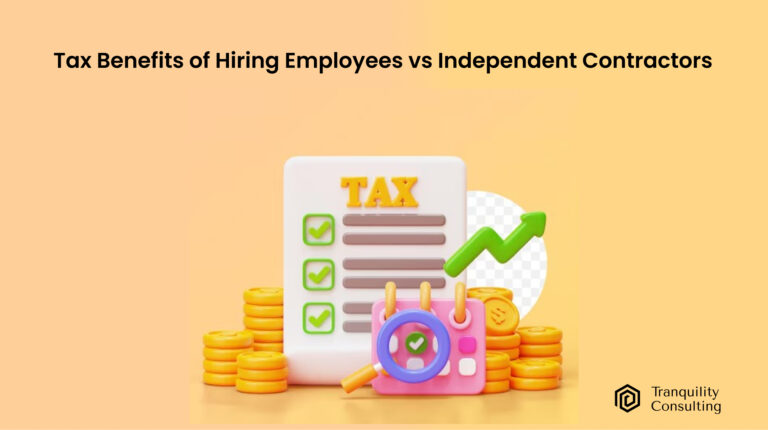When running a business, one of the most crucial decisions you’ll make is whether to hire employees or independent contractors. Each option comes with its own set of advantages, particularly regarding taxes. Understanding the tax benefits and obligations associated with each can help you make an informed decision that aligns with your business goals. This blog will break down the tax implications of hiring employees versus independent contractors, highlighting key benefits and considerations for both.
The Basics: Employees vs Independent Contractors
Before delving into tax benefits, let’s clarify the fundamental difference between employees and independent contractors.
- Employee: An individual who works for an employer under an agreement where the employer has the right to control what the worker does and how the work is performed.
- Independent Contractor: A self-employed individual who offers services to a business under the terms outlined in a contract. The company has less control over how the work is performed.
The distinction is crucial because it affects tax liability, employment benefits, and other legal considerations.
Tax Benefits of Hiring Employees
- Payroll Tax Deductions
When hiring employees, you must pay payroll taxes, including Social Security, Medicare, and federal unemployment. However, businesses can often deduct some expenses as business costs. The wages you pay your employees are fully deductible from your taxable income, which can lower your overall tax burden.
- Employee Benefits Deductions
Many businesses offer employee benefits such as health insurance, retirement plans, and paid leave. The costs associated with providing these benefits are typically tax-deductible.
Deducting Training and Development Costs
Investing in employee training and development programs can lead to long-term benefits for your company, and the associated costs are typically tax-deductible. Whether paying for certifications, seminars, or online courses, your business can deduct these expenses, lowering your overall taxable income.
- Tax Credits for Hiring
There are several tax credits available to businesses that hire employees. Programs like the Work Opportunity Tax Credit (WOTC) offer financial incentives for hiring individuals from certain target groups, such as veterans, long-term unemployed individuals, or people with disabilities. This can help reduce your federal tax liability.
Tax Benefits of Hiring Independent Contractors
While independent contractors are not considered employees, hiring them also offers significant tax advantages.
- Reduced Payroll Taxes
One of the most significant benefits of hiring independent contractors is that you are not responsible for paying payroll taxes. Contractors are responsible for paying their Social Security, Medicare, and unemployment taxes. This reduces the administrative burden on your company and leads to significant tax savings.
- Simplified Tax Reporting
When you hire an independent contractor, your reporting obligations are more straightforward compared to employees. Instead of providing a W-2 form, you only need to file a 1099-NEC form if you’ve paid the contractor more than $600 during the year. This cuts down on the paperwork and compliance required, freeing up resources and time for your business.
- Tax Deductions on Contract Fees
Like employees’ wages, independent contractors’ payments are tax-deductible as a business expense. You can deduct the amounts paid for their services from your company’s gross income, reducing your taxable income. This is particularly beneficial for project-based work or specialized services.
Flexibility and Cost Efficiency
Beyond direct tax benefits, hiring independent contractors often provides flexibility that can lead to cost efficiency. Since contractors work on a project-by-project basis, you only pay them for the work completed, unlike employees who receive regular salaries regardless of workload. This flexibility can lead to savings in both labor costs and overhead expenses. Moreover, contractors are responsible for their benefits, including health insurance and retirement plans, which can further reduce your company’s financial burden.
Risks and Challenges to Consider
While there are clear tax benefits to hiring independent contractors, there are also risks and challenges to keep in mind:
- Misclassification Penalties
The IRS is very strict about worker classification. Misclassifying an employee as an independent contractor can lead to severe penalties, including back taxes, interest, and fines. It’s essential to ensure that your contractors meet the legal definition of independent contractors and that your relationship complies with IRS guidelines.
- Limited Control Over Work
Unlike employees, independent contractors have greater control over how they complete their work. This can limit your ability to oversee the quality and timing of deliverables. Hiring employees may be better if you need more direct control over your workers.
Cost Comparison: Employees vs Independent Contractors
To fully understand the financial implications, it’s essential to consider the overall costs associated with hiring employees versus independent contractors.
Hiring Employees:
- Salary: Fixed, regardless of workload.
- Payroll taxes: Employers must pay Social Security, Medicare, and unemployment taxes.
- Benefits: Health insurance, paid leave, retirement contributions, etc.
- Training and development: Often a significant investment.
Hiring Independent Contractors:
- Fees: Pay only for work completed.
- Payroll taxes: Not applicable. Contractors handle their taxes.
- Benefits: Contractors cover their benefits and insurance.
- Training and development: Contractors are responsible for their professional development.
From a purely financial perspective, independent contractors can often be less expensive than employees in the short term. However, the stability and loyalty of hiring employees can lead to long-term business growth.
Making the Right Choice for Your Business
Hiring employees or independent contractors will ultimately depend on your business model, needs, and growth strategy. Here are some questions to consider:
- Do you need ongoing, consistent work, or is your workload project-based?
- How much control do you need over your workers’ schedules and how they complete their tasks?
- Are you prepared to offer benefits and cover the additional costs of hiring employees?
- How important is flexibility in your hiring strategy?
By carefully weighing the tax benefits, costs, and legal implications, you can make the best decision for your business.
Conclusion
Both employees and independent contractors offer distinct tax benefits and cost structures, and the best choice depends on your business’s needs. While employees provide long-term stability and eligibility for certain tax credits, independent contractors can offer cost savings and flexibility without the responsibility of payroll taxes and benefits. Understanding these tax implications is crucial to ensuring that your business remains compliant and efficient while taking full advantage of available deductions and credits. By carefully evaluating the tax benefits of hiring employees versus independent contractors, you can make an informed decision that helps optimize your business’s tax strategy and financial health.
FAQs
1. What are the tax benefits of hiring employees?
Tax benefits include payroll tax deductions, employee benefits deductions and eligibility for tax credits such as the Work Opportunity Tax Credit (WOTC).
2. What are the tax benefits of hiring independent contractors?
Businesses save on payroll taxes and benefit from simplified tax reporting. Payments made to contractors are also fully tax-deductible.
3. Are there tax credits available for hiring employees?
Yes, businesses can qualify for several tax credits, such as the Work Opportunity Tax Credit (WOTC), for hiring individuals from target groups.
4. How do misclassifying employees as independent contractors affect my taxes?
Misclassifying workers can result in IRS penalties, back taxes, and interest. To avoid this, it’s essential to follow IRS guidelines.
5. How does Tranquility Consulting help businesses with worker classification?
Tranquility Consulting assists businesses in ensuring proper worker classification, compliance with tax regulations, and optimizing workforce management.
If you have any questions or need business-related tax consulting advice, please contact us at: [email protected]





